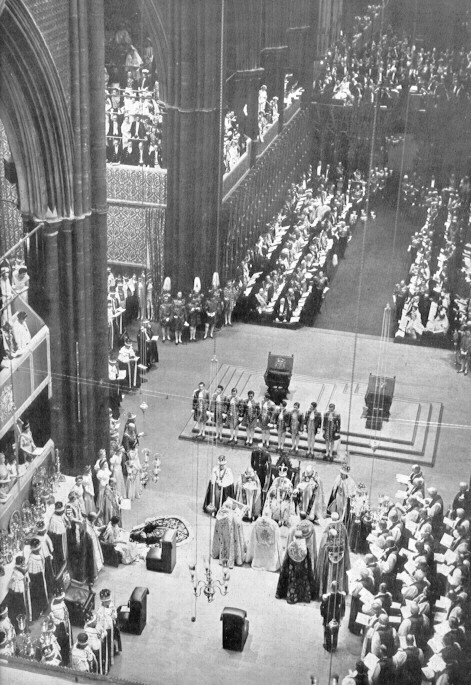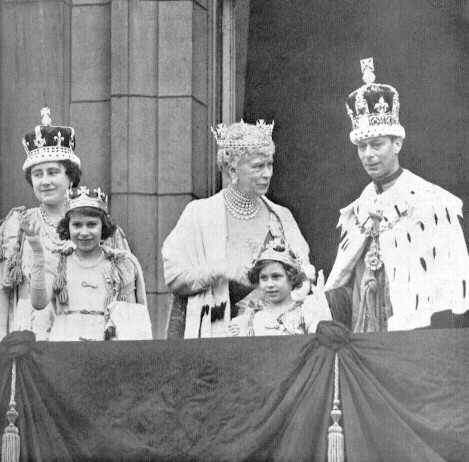Eden: ”And Chancellor Hitler demanded return of German colonies, announced the end of reparations provisions for the management of the Reichsbank and German railways as nongovernmental concerns, and repudiated the war-guilt clause of the Versailles treaty; and he said that Germany was ready to guarantee the inviolability and neutrality of Belgium and The Netherlands.”
Cooper: ”Awfully nice of the fellow to say so. How far do we trust him then?”
Baldwin: ”It’s a situation where we have to inspire some sort of trust in the man. The alternatives are impossible even to consider. Herr Hitler is flexing the German muscle, and I fear that many countries will rush to accept him at his word.”
Chamberlain: ”And why not? Certainly there’s a case to made for German considerations of the Versailles treaty. We’ve struggled for seventeen years to come to grips to that. While I deplore the unilateral nature of his actions, I’m not automatically opposed. He did use the phrase ’peace is our dearest treasure’. A man after my own heart.”

Cooper: ”If he means it.”
Baldwin: ”Hmm yes, well, that delicate question I leave to the good graces of time. Anything else on the subject, Mr. Eden?”
Eden: ”Just that I don’t find it to be a surprising trend. The Germans did nationalize the Kiel Canal again on the 16th, and thus far this government hasn’t raised objections. I think the Chancellor is testing the extent of his newfound passion for international drama.”
Baldwin: ”Quite. Now then. I believe we have a report on the Spanish Rebellion?”
Inskip: ”Ah, yes, Stanley. Duff here had a few words on the fighting in Pamplona.”
Cooper: ”I just wanted to update you on the latest. Barring a miracle, I’d say these Nationalist fellows have had it. Generalissimo Yague and his cronies have thus far demonstrated a poor record on the field of battle. They’ve completed their retreat from the outskirts of Madrid, but Miaja closed that awful trap around Pamplona, and they lost two more divisions. See here...”

Inskip: ”Just about over, I trust. Well, perhaps Spain will become more...sensible...once all this fuss has gone down.”
Cooper: ”We’ll see. Remember in Ethiopia we anticipated a quick Italian victory, and it still took months.”
Baldwin: ”You predicted a quick victory, Duff!”
Cooper: ”Of course, Prime Minister. I only want to emphasize that Generalissimo Yague has eight divisions massed in their ‘capital’ at Burgos, and they’re partially protected by the Duero to the south, and somewhat by the Ebro to the east. It will be difficult for Miaja’s forces to approach. And the Republicans aren’t massed yet for a final thrust. It will take some time.”
Baldwin: ”I may not like these Republicans but I will certainly glad when this whole affair is over. The whole business has made the business of keeping the peace in Europe much too unpleasant. Anything else. Neville?”
Chamberlain: ”Nothing much to add, sir. Mr. Julien wanted me to remind you that he’s just about completed his summary of last month’s Parliamentary sessions as well as a sidebar on domestic opinion. I thought it would add to your briefing. I’m hoping to have it on your desk in the morning.”
Baldwin: ”Good, good. Anthony?”
Eden: ”Nothing at the moment, sir. You wanted me to come by later and discuss the American troubles with their courts?”
Baldwin: ”I just thought perhaps there might be a few good ideas in what Mr. Roosevelt was trying to do with his judiciary, that’s all. Nothing for the moment. Just for reference sake.”

Cooper: ”Awfully nice of the fellow to say so. How far do we trust him then?”
Baldwin: ”It’s a situation where we have to inspire some sort of trust in the man. The alternatives are impossible even to consider. Herr Hitler is flexing the German muscle, and I fear that many countries will rush to accept him at his word.”
Chamberlain: ”And why not? Certainly there’s a case to made for German considerations of the Versailles treaty. We’ve struggled for seventeen years to come to grips to that. While I deplore the unilateral nature of his actions, I’m not automatically opposed. He did use the phrase ’peace is our dearest treasure’. A man after my own heart.”
US warentry –4
French warentry –2
Belgian warentry –5
Luxembourg warentry –3
Dutch warentry –5
Republican Spain warentry –1
French warentry –2
Belgian warentry –5
Luxembourg warentry –3
Dutch warentry –5
Republican Spain warentry –1
Cooper: ”If he means it.”
Baldwin: ”Hmm yes, well, that delicate question I leave to the good graces of time. Anything else on the subject, Mr. Eden?”
Eden: ”Just that I don’t find it to be a surprising trend. The Germans did nationalize the Kiel Canal again on the 16th, and thus far this government hasn’t raised objections. I think the Chancellor is testing the extent of his newfound passion for international drama.”
Baldwin: ”Quite. Now then. I believe we have a report on the Spanish Rebellion?”
Inskip: ”Ah, yes, Stanley. Duff here had a few words on the fighting in Pamplona.”
Cooper: ”I just wanted to update you on the latest. Barring a miracle, I’d say these Nationalist fellows have had it. Generalissimo Yague and his cronies have thus far demonstrated a poor record on the field of battle. They’ve completed their retreat from the outskirts of Madrid, but Miaja closed that awful trap around Pamplona, and they lost two more divisions. See here...”
Inskip: ”Just about over, I trust. Well, perhaps Spain will become more...sensible...once all this fuss has gone down.”
Cooper: ”We’ll see. Remember in Ethiopia we anticipated a quick Italian victory, and it still took months.”
Baldwin: ”You predicted a quick victory, Duff!”
Cooper: ”Of course, Prime Minister. I only want to emphasize that Generalissimo Yague has eight divisions massed in their ‘capital’ at Burgos, and they’re partially protected by the Duero to the south, and somewhat by the Ebro to the east. It will be difficult for Miaja’s forces to approach. And the Republicans aren’t massed yet for a final thrust. It will take some time.”
Baldwin: ”I may not like these Republicans but I will certainly glad when this whole affair is over. The whole business has made the business of keeping the peace in Europe much too unpleasant. Anything else. Neville?”
Chamberlain: ”Nothing much to add, sir. Mr. Julien wanted me to remind you that he’s just about completed his summary of last month’s Parliamentary sessions as well as a sidebar on domestic opinion. I thought it would add to your briefing. I’m hoping to have it on your desk in the morning.”
Baldwin: ”Good, good. Anthony?”
Eden: ”Nothing at the moment, sir. You wanted me to come by later and discuss the American troubles with their courts?”
Baldwin: ”I just thought perhaps there might be a few good ideas in what Mr. Roosevelt was trying to do with his judiciary, that’s all. Nothing for the moment. Just for reference sake.”
US dissent +1
US moves towards democracy +10
US moves towards democracy +10
(note: couldn't resist, as this is one of mine)







































